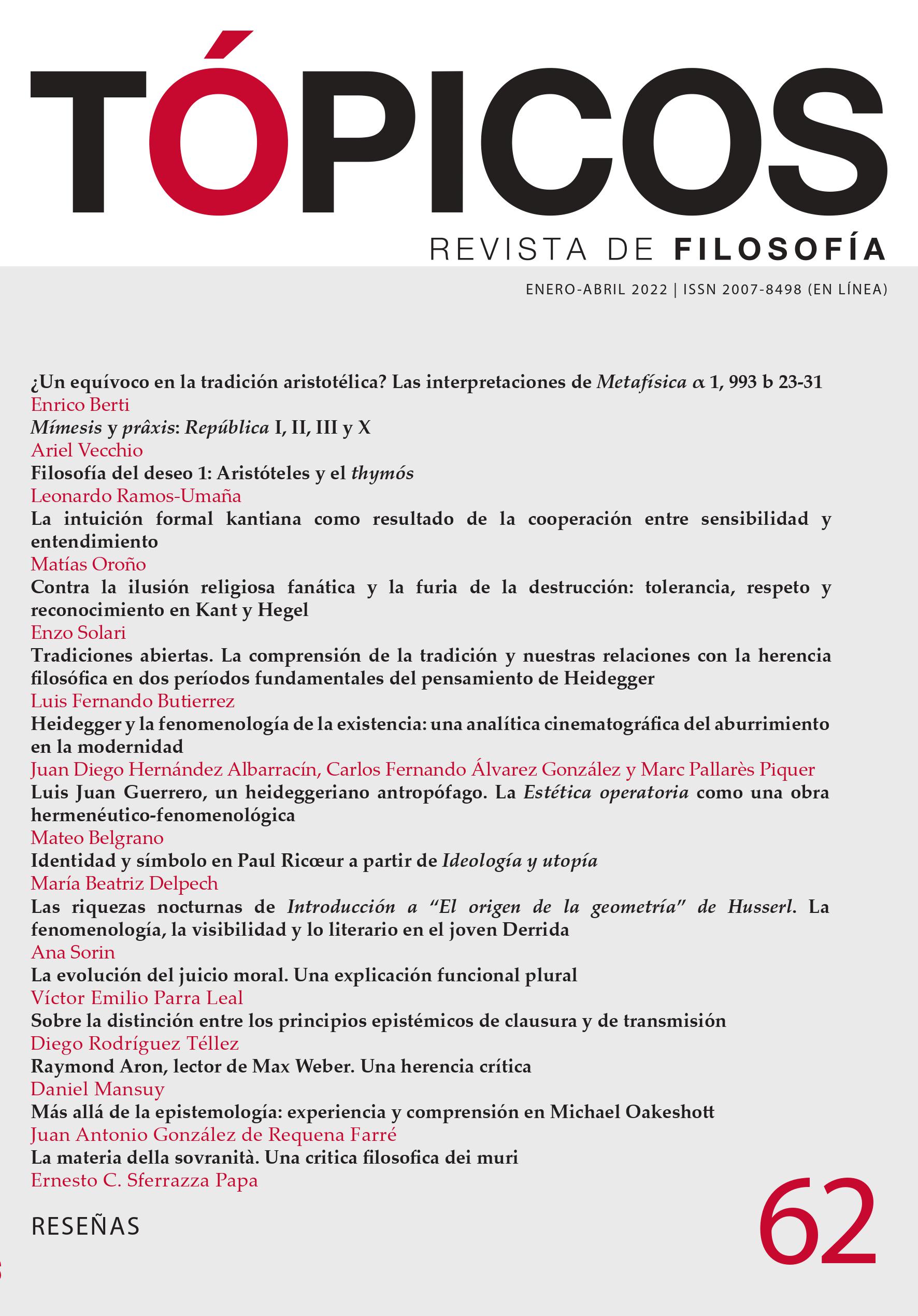Published 2021-12-11
Keywords
- epistemology,
- experience,
- understanding,
- rationalism,
- British idealism
Copyright (c) 2021 Tópicos, Revista de Filosofía

This work is licensed under a Creative Commons Attribution-NonCommercial-NoDerivatives 4.0 International License.
How to Cite
Abstract
Usually, the criticism of the modern foundational epistemo-
logical project and the representational conception of knowledge is associated with the philosophies of Heidegger and Wittgenstein. However, in an epigone of British idealism such as Michael Oakeshott, one can also recognize a singular position against philosophical foundationalism, representational epistemology, the theory of truth as correspondence and universalist rationalism. This article aims to reconstruct Oakeshott’s philosophical inquiries into the conditions of human experience and understanding. Through the exegesis of his philosophical essays, we propose an integral reading of his systematic reflection on the modalities of human knowledge, which coherently combines idealistic, skeptical, and hermeneutical motives beyond the temptations of traditional epistemology.
References
- Alexander, J. (2012). Oakeshott as Philosopher. En E. Podoksik (ed.), The Cambridge Companion to Oakeshott. (pp. 7-41). Cambridge University Press.
- Boucher, D. (2012). Oakeshott in the Context of British Idealism. En E. Podoksik (ed.), The Cambridge Companion to Oakeshott. (pp. 245-273). Cambridge University Press.
- Boucher, D. y Vincent, A. (2012). British Idealism: A Guide for the Perplexed. Continuum.
- Franco, P. (2004). Michael Oakeshott: An Introduction. Yale University Press.
- Gadamer, H.-G. (2003). Verdad y método. I. A. Agud Aparicio y R. de Agapito (trads.). Ediciones Sígueme.
- Gadamer, H.-G. (2004). Verdad y método. II. M. Olasagasti (trad.). Ediciones Sígueme.
- Isaacs, S. (2006). The Politics and Philosophy of Michael Oakeshott. Routledge.
- López Atanes, F. J. (2010). Conducta humana y sociedad civil. Introducción a la filosofía política de M. Oakeshott. Unión Editorial.
- Marsh, L. (2005). Constructivism and Relativism in Oakeshott. En T. Fuller y C. Abel (eds.), The Intellectual Legacy of Michael Oakeshott. (pp. 238-262). Imprint Academic.
- Nardin, T. (2001). The Philosophy of Michael Oakeshott. The Pennsylvania State University Press.
- Oakeshott, M. (1966). Experience and its Modes. Cambridge University Press.
- Oakeshott, M. (2000). El racionalismo en la política y otros ensayos. E. L. Suárez (trad.). Fondo de Cultura Económica.
- Oakeshott, M. (2003). On Human Conduct. Clarendon Press.
- Oakeshott, M. (2009). La voz del aprendizaje liberal. A. Bello, (trad.). Katz.
- Oakeshott, M. (2013). Sobre la historia y otros ensayos. M. V. Rodil (trad.). Katz.
- Plotica, L. P. (2015). Michael Oakeshott and the Conversation of Modern Political Thought. State University of New York Press.
- Podoksik, E. (2003). In Defence of Modernity: Vision and Philosophy in Michael Oakeshott. Imprint Academic.
- Ricœur, P. (1990). Freud: una interpretación de la cultura. A. Suárez, M. Olivera y E. Inciarte (trads.). Siglo XXI.
- Rorty, R. (1989). La filosofía y el espejo de la naturaleza. J. Fernández Zulaica (trad.). Cátedra.
- Taylor. C. (1997). Argumentos filosóficos. F. Birulés Beltrán (trad.). Paidós.
- Tseng, R. (2003). The Sceptical Idealist: Michael Oakeshott as a Critic of the Enlightenment. Imprint Academic.
- Turner, S. (2005). The English Heidegger. Philosophy of the Social Sciences, 35(3), 353-368. DOI: https://doi.org/10.1177/0048393105277991.
- Wells, H. (1994). The Philosophical Michael Oakeshott. Journal of the History of Ideas, 55(1), 129-145. DOI: https://doi.org/10.2307/2709957.
- Worthington, G. (2002). The Voice of Poetry in Oakeshott’s Moral Philosophy. The Review of Politics, 64(2), 285-310.






